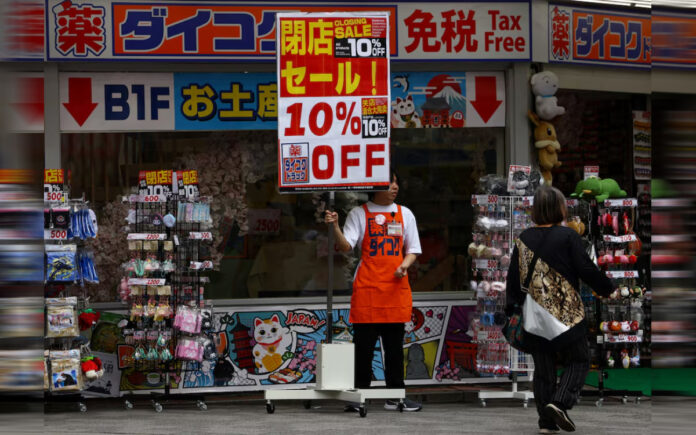Tokyo: Japan’s economy recorded its first contraction in a year, shrinking more than expected in the March quarter and raising concerns about the strength of its fragile recovery amid looming U.S. trade actions.
Preliminary government data released Friday showed that real gross domestic product (GDP) fell at an annualized rate of 0.7% in the January-March period, a steeper decline than the median market forecast of a 0.2% drop. The contraction highlights growing vulnerabilities in Japan’s export-driven economy, especially in light of U.S. President Donald Trump’s escalating tariff policies.
The slump was driven primarily by stagnant private consumption and a drop in exports—signs that overseas demand was already weakening before Trump’s April 2 announcement of sweeping “reciprocal” tariffs targeting key U.S. trading partners.
There were some positive signals. Revised data for the final quarter of 2024 showed GDP growth slightly improving to 2.4% from the previously reported 2.2%. Capital expenditure rose 1.4%, outpacing expectations and contributing 0.7 percentage point to domestic demand.
Still, analysts warn that soft demand and the intensifying threat of U.S. tariffs could drag the economy further.
“Japan’s economy lacks a driver of growth given weakness in exports and consumption. It’s very vulnerable to shocks such as one from Trump tariffs,” said Yoshiki Shinke, senior executive economist at Dai-ichi Life Research Institute. “The data may lead to growing calls for bigger fiscal spending,” he added, noting that the economy could shrink again in the second quarter depending on the scale and timing of the tariff impact.
On a quarter-on-quarter basis, GDP declined 0.2%, compared with a 0.1% contraction forecast by economists.
Tariff Pressure Mounts
Economic Revitalisation Minister Ryosei Akazawa expressed cautious optimism, citing major corporate wage hikes that could help support moderate recovery. However, he also acknowledged the risks ahead.
“We must be mindful of downside risks to the economy from U.S. tariff policy. The hit to consumption and household sentiment from continued price rises is also a risk to growth,” Akazawa told a news conference following the release of the GDP data.
Private consumption, which constitutes over half of Japan’s economic output, was flat in the first quarter—short of the 0.1% gain anticipated by markets. Meanwhile, the GDP deflator rose 3.3% year-on-year in January-March, marking its second consecutive quarter of acceleration, signaling rising input costs.
External demand was a major drag on growth, subtracting 0.8 percentage point from GDP. Exports declined 0.6% while imports jumped 2.9%, all before the full brunt of U.S. tariffs is felt.
Trump has imposed a 10% tariff on all countries except Canada, Mexico, and China, while Japan faces a 24% tariff beginning in July unless it reaches a trade agreement with Washington. In addition, Washington’s 25% tariffs on cars, steel, and aluminum have already begun to impact Japan’s key auto industry.
Corporate Fallout
Japanese automakers are feeling the strain. Toyota Motor projected a 20% decline in profits for the current fiscal year, while Mazda withheld earnings forecasts for the year through March 2026, citing trade uncertainty.
“The early-year (GDP) contraction serves as a reminder of Japan’s economic struggles. Tariff pain and weak domestic momentum will weigh on growth in the quarters ahead,” said Stefan Angrick, head of Japan and Frontier Markets Economics at Moody’s Analytics.
Also Read | US Mulls New Sanctions on Chinese Semiconductor Firms Amid Trade Talks
The bleak GDP figures may increase pressure on Prime Minister Shigeru Ishiba to respond to calls from lawmakers for tax relief or a new stimulus package, although Akazawa indicated that no such measures were currently under consideration.
Policy Dilemma for BOJ
The unfolding global trade war also complicates the Bank of Japan’s monetary policy outlook. After exiting over a decade of ultra-loose monetary policy, the BOJ raised interest rates to 0.5% in January and has signaled more hikes are possible if growth and inflation remain on track.
However, concerns over a Trump-triggered global slowdown led the central bank to slash its growth forecasts during its April 30–May 1 meeting, casting doubt on its previous optimism that rising wages would boost consumption and broader economic momentum.
Also Read | Cannes Bars French Actor Amid Controversy, Reinforces Commitment to Safety
Although a recent easing of U.S.-China trade tensions has offered some relief, Japan’s position remains uncertain. Bilateral talks with the U.S. continue, and Tokyo has yet to secure exemptions from Trump’s tariff regime.
“If the impact of Trump tariffs is fairly light, the BOJ could raise interest rates again in September or October. But if the tariffs deal a severe blow to capital spending and exports, rate hikes could be put on hold,” said Takeshi Minami, chief economist at Norinchukin Research Institute.



